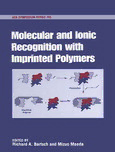Download Molecular and Ionic Recognition with Imprinted Polymers PDF Free - Full Version
Download Molecular and Ionic Recognition with Imprinted Polymers by Richard A. Bartsch and Mizuo Maeda (Eds.) in PDF format completely FREE. No registration required, no payment needed. Get instant access to this valuable resource on PDFdrive.to!
About Molecular and Ionic Recognition with Imprinted Polymers
Content: Molecular and ionic recognition with imprinted polymers : a brief overview / Mizuo Maeda and Richard A. Bartsch -- Molecular imprinting for the preparation of enzyme-analogous polymers / Günter Wulff, Thomas Gross, Rainer Schönfeld, Thomas Schrader, and Christian Kirsten -- Molecular imprinting : status artis et quo vadere? / Klaus Mosbach, Karsten Haupt, Xiao-Chuan Liu, Peter A.G. Cormack, and Olof Ramström -- Important considerations in the design of receptor sites using noncovalent imprinting / Börje Sellergren -- Recent advances in the use of molecularly imprinted materials in separation and synthesis / Olof Ramström, Lei Ye, Cong Yu, and Per-Erik Gustavsson -- Applications of molecular imprinting to the recognition and detection of bioactive molecules / Scott J. McNiven, Soo-Hwan Cheong, Raphael Levi, Yohei Yokobayashi, Takeshi Nakagiri, Kazuyoshi Yano, and Isao Karube -- Chiral ligand exchange adsorbents for amines and underivatized amino acids : 'bait-and-switch' molecular imprinting / Frances H. Arnold, Susanne Striegler, and Vidyasankar Sundaresan -- Recognition of drugs and herbicides : strategy in selection of functional monomers for noncovalent molecular imprinting / Toshifumi Takeuchi and Jun Matsui -- Noncovalent molecular imprinting of a synthetic polymer with the herbicide 2,4-dichlorophenoxyacetic acid in the presence of polar protic solvents / Karsten Haupt -- Development of uniform-sized, molecular-imprinted stationary phases for HPLC / Ken Hosoya and Nubuo Tanaka -- Designing metal complexes in porous organic hosts / John F. Krebs and A.S. Borovik -- Molecularly imprinted polymeric membranes for optical resolution / Masakazu Yoshikawa -- Molecular imprinted membranes prepared by phase inversion of polyacrylonitrile copolymers containing carboxylic acid groups / Takaomi Kobayashi, Hong Ying Wang, Takahiro Fukaya, and Nobuyuki Fujii -- Imprinting of proteins on polymer-coated DNA for affinity separation with enhanced selectivity / Daisuke Umeno, Masafumi Kawasaki, and Mizuo Maeda -- Templated polymers for the selective sequestering and sensing of metal ions / Xiangfei Zeng, Anton Bzhelyansky, Sue Y. Bae, Amanda L. Jenkins, and George M. Murray -- Metal ion templated polymers : studies of N-(4-vinylbenzyl)-1,4,7-triazacyclononane-metal ion complexes and their polymerization with divinylbenzene : the importance of thermodynamic and imprinting parameters in metal ion selectivity studies of the demetalated, templated polymers / Richard H. Fish -- Surface imprinting : preparation of metal ion-imprinted resins by use of complexation at the aqueous-organic interface / Kazuhiko Tsukagoshi, Kai Yu Yu, Yoshihisa Ozaki, Tohru Miyajima, Mizuo Maeda, and Makoto Takagi -- Selective adsorption of metal ions to surface-templated resins prepared by emulsion polymerization using a functional surfactant / Yoshifumi Koide, Hideto Shosenji, Mizuo Maeda, and Makoto Takagi -- Metal ion-imprinted polymers prepared by surface template polymerization with water-in-oil emulsions / Kazuya Uezu, Masahiro Goto, and Fumiyuki Nakashio -- A physicochemical study on the origin of the imprinting effect / Tohru Miyajima, Kyoko Sohma, Shin-ichi Ishiguro, Masaki Ando, Shigeo Nakamura, Mizuo Maeda, and Makoto Takagi -- Recognition over footprint cavities / Kensaku Morihara -- Molecular imprinted receptors in sol-gel materials for aqueous phase recognition of phosphates and phosphonates / Darryl Y. Sasaki, Daniel J. Rush, Charles E. Daitch, Todd M. Alam, Roger A. Assink, Carol S. Ashley, C. Jeffrey Brinker, and Kenneth J. Shea.
Detailed Information
| Author: | Richard A. Bartsch and Mizuo Maeda (Eds.) |
|---|---|
| Publication Year: | 1998 |
| Pages: | 340 |
| Language: | English |
| File Size: | 29.112 |
| Format: | |
| Price: | FREE |
Safe & Secure Download - No registration required
Why Choose PDFdrive for Your Free Molecular and Ionic Recognition with Imprinted Polymers Download?
- 100% Free: No hidden fees or subscriptions required for one book every day.
- No Registration: Immediate access is available without creating accounts for one book every day.
- Safe and Secure: Clean downloads without malware or viruses
- Multiple Formats: PDF, MOBI, Mpub,... optimized for all devices
- Educational Resource: Supporting knowledge sharing and learning
Frequently Asked Questions
Is it really free to download Molecular and Ionic Recognition with Imprinted Polymers PDF?
Yes, on https://PDFdrive.to you can download Molecular and Ionic Recognition with Imprinted Polymers by Richard A. Bartsch and Mizuo Maeda (Eds.) completely free. We don't require any payment, subscription, or registration to access this PDF file. For 3 books every day.
How can I read Molecular and Ionic Recognition with Imprinted Polymers on my mobile device?
After downloading Molecular and Ionic Recognition with Imprinted Polymers PDF, you can open it with any PDF reader app on your phone or tablet. We recommend using Adobe Acrobat Reader, Apple Books, or Google Play Books for the best reading experience.
Is this the full version of Molecular and Ionic Recognition with Imprinted Polymers?
Yes, this is the complete PDF version of Molecular and Ionic Recognition with Imprinted Polymers by Richard A. Bartsch and Mizuo Maeda (Eds.). You will be able to read the entire content as in the printed version without missing any pages.
Is it legal to download Molecular and Ionic Recognition with Imprinted Polymers PDF for free?
https://PDFdrive.to provides links to free educational resources available online. We do not store any files on our servers. Please be aware of copyright laws in your country before downloading.
The materials shared are intended for research, educational, and personal use in accordance with fair use principles.

